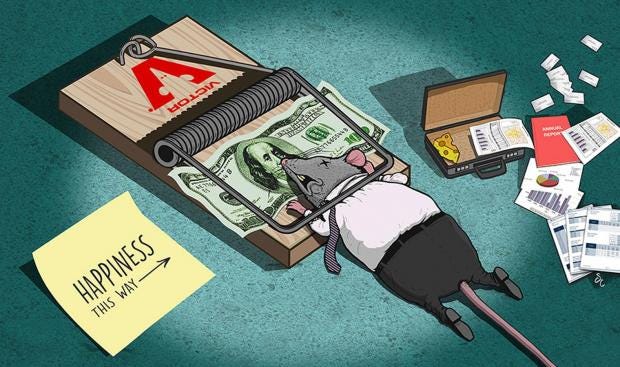Money Can't Buy Happiness, Part II
Everybody seems to think that the more wealth one gets, the happier they will be.The ability to buy a fancy car and the latest iPhone equates to ultimate bliss, right? It sounds outrageous - and it is - but deep down, we all believe so. Eighner contradicts this in his essay on his life of "Dumpster diving". He owns no tangible items other than the clothes on his back and his dog, but he is happy. In fact, he avoids taking anything from the dumpster he doesn't need. Even though he has close to nothing, he "hardly picks up a thing without envisioning the time [he] will cast it away". He has intangible things, though, such as a companion (Lizbeth). He therefore has a "healthy state of mind".
 Contrast this to what may the exact opposite situation: celebrities. They own big fancy mansions with every tangible thing they could ever want, and the money to buy anythi
Contrast this to what may the exact opposite situation: celebrities. They own big fancy mansions with every tangible thing they could ever want, and the money to buy anythi
ng beyond that. They live a life of luxury. But how many celebrities have we heard of with mental illnesses; how many celebrities have committed suicide? They had every tangible thing they could ever want. What they lacked was the intangible things: a private life free from the public eye, an internal goal to work towards other than public approval, someone to ride the public bus with them when the limo breaks down.
Tangible objects don't equate happiness. True wealth is having the intangible things which keep us going in life. As the (cliché but true) saying goes, money can't buy happiness.
 Contrast this to what may the exact opposite situation: celebrities. They own big fancy mansions with every tangible thing they could ever want, and the money to buy anythi
Contrast this to what may the exact opposite situation: celebrities. They own big fancy mansions with every tangible thing they could ever want, and the money to buy anythiTangible objects don't equate happiness. True wealth is having the intangible things which keep us going in life. As the (cliché but true) saying goes, money can't buy happiness.

Comments
Post a Comment